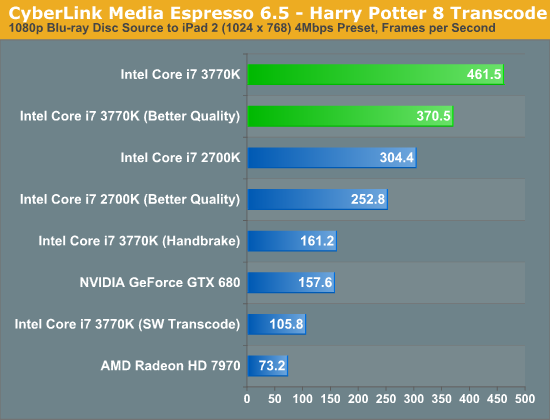UNKNOWN9122,
What do you disagree with hard real world data? Most reviewers test a stock i7 920 @ 2.66ghz against an i7-3770K. Of course the latter would beat it in games. That's not how enthusiast gamers on this site use their parts though. Many of us overclock. Take a Core i7 920 @ 3.8-4.2ghz and you'd be seriously hard pressed to tell the difference between that an an i7-3770K OC if you are only using 1 GPU. You'd need to start using 2 GPUs to really push the CPU to the limits. For most games today, you are going to be by far GPU bottlenecked - Hitman Absolution, Sleeping Dogs, Far Cry 3, not to mention games like Metro Last Light, Crysis 3 should be even more GPU demanding.
I mean if you need the absolutely faster CPU for MMOs or Starcraft 2 where most of those titles are poorly threaded and benefit a lot from IPC per core, then by all means upgrade. I will be upgrading from Sandy Bridge because I like to play with new parts, not because I will feel the difference in gaming speed.
dividebyzero,
"Don't use IGP myself, but if I was to ever need to sell an old discrete graphics card to fund a new one, at least Haswell's HD4600 would make needing a placeholder card redundant - if it can drive 4K displays, then a paltry 2560x1440 shouldn't represent a problem."
Ya, that's a good point. The problem is Intel is putting GT2 series GPU into high-end desktop Haswells, with the much faster GT3 being reserved for mobile parts. Other than driving the displays, it's unlikely that Haswell's IGP on the desktop will amount to much. People who play less GPU demanding titles like Civilization 5, Starcraft 2 or Minecraft are actually more likely to use an APU. It's not like someone with an i7-4770K is going to fire up BF3 or Crysis 3.
In those popular titles that many play on laptops, Intel's GPU actually performs the worst!
http://images.anandtech.com/graphs/graph6332/50163.png
http://images.anandtech.com/graphs/graph6332/50165.png
http://images.anandtech.com/graphs/graph6332/50122.png
^ You can see that even if Intel's 4600 GPU is 2x faster than HD4000 series, it's still way too slow for modern gaming. Alternatively, you can extrapolate based on this chart:
http://alienbabeltech.com/abt/viewtopic.php?p=41174
For bare minimum gaming of modern titles like FC3 or Sleeping Dogs, HD7750 is necessary. That GPU is 4.4x faster than HD4000 series.
Support for 4K TVs on Haswell is pure marketing and has almost no practical applications since a 32 inch 4K LCD monitor for PC costs $20,000+. Given how high the prices of 30 inch 2560x1600 monitors still are, it will be a miracle if 4K LCD monitors on the PC are affordable even for enthusiasts in the next 5 years. Most likely it will take longer.
http://www.engadget.com/2012/06/05/viewsonic-vp3280-led-4k-monitor-hands-on/
4K is not at all a selling feature for this generation CPU, maybe for a CPU that's out in 4-5 years it will be.
If someone really wanted a stop-gap budget card to drive their 30 inch 2560x1600 monitor, it's way cheaper to buy a $15 GT210 than to "upgrade to Haswell".
http://www.newegg.com/Product/Product.aspx?Item=N82E16814150640
None of the points you provided are valid enough for upgrading to Haswell from modern i7s, especially from modern SB/IVB CPUs. You sighted an example of an i5 that uses 35W but even if a CPU uses 65W, the break-even on electricity consumption cost will be like 10-20 years compared with the cash outlay to upgrade.
Like I said, upgrading to Haswell will be mostly for those who are using very old CPUs like Core 2 Duo/Quad (65nm/45nm) or for gaming enthusiasts/overclockers who like playing with new parts and would have upgraded even if Haswell was only 15% faster.
Other features might be more important like Thunderbolt for external storage. But even that is stretching it.
Summer 2006 Intel gave us E6600 2.4ghz
Summer 2007 for the same price we got Q6600 2.4ghz (2x the cores)
Fall 2008 we got i7 920 that overclocked like mad and had a real tangible difference from Q6600.
Since then, it's been mostly stagnation on Intel side unless you ponied up for i7-3930X.
